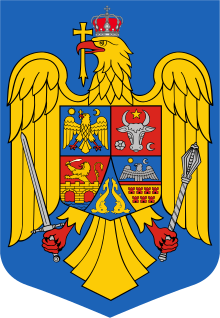Mining industry of Romania
Romania ranks tenth in the world in terms of the diversity of minerals produced in the country. Around 60 different minerals are currently produced in Romania. The richest mineral deposits in the country are halite (sodium chloride).
Romania is an oil producer, but the level of production is not enough to make the country self-sufficient. As a result, it is a net oil and gas importer.
The pipeline network in Romania included 1,738 km for crude oil, 2,321 km for petroleum products, and 708 km for natural gas in 1999. Several major new pipelines are planned, especially the Nabucco Pipeline for Caspian oilfields, the longest one in the world.
According to the CIA World Factbook, other natural resources include coal, iron ore, copper, chromium, uranium, antimony, mercury, gold, barite, borate, celestine (strontium), emery, feldspar, limestone, magnesite, marble, perlite, pumice, pyrites (sulfur), clay, arable land, hydropower. In Roșia Montană area is the largest gold deposit in continental Europe, estimated at over 300 tons of gold and 1,600 tons of silver, having a value of $3 billion.[1]
Romania's mineral production is adequate to supply its manufacturing output. Energy needs are also met by importing bituminous and anthracite coal and crude petroleum. In 2007 approximately 13.4 million tons of anthracite coal, approximately 4,000 tons of tungsten, 565,000 tons of iron ore, and 47,000 tons of zinc ore were mined. Lesser amounts of copper, lead, molybdenum, gold, silver, kaolin, and fluorite also were mined.
In 2016, Gabriel Resources launched arbitration and disclosed it sought $4.4 billion worth of damages from Romania at the World Bank. It accuses Romania of unfairly blocking the company's $2 billion project creating one of the continent's largest gold mines. The government then served the Canadian company with a $8.6 million taxes bill.[2][3]
Figures
In 2004, according to Europaworld.com, the main mining industries in thousand metric tons were:[4]
- brown coal (including lignite): 31,592
- crude petroleum: 5,465
- iron ore: 275
- copper 786.8
- lead concentrates: 15.0
- zinc concentrates: 18.6
- salt (unrefined): 2,398
- natural gas (million cubic meters): 13,290
See also
References
- "Roșia Montană", Dezvaluiri.go.ro
- Neil Buckley, Romania hit by $4.4bn damages claim over stalled gold mine project. Financial Times, June 29 2017.
- Kit Gillet. Romania hits Canadian firm with $9m 'retaliatory' tax bill over gold mine. The Guardian, 14 July 2017.
- "Romania". The Europa World Year Book. 2 (48 ed.). London and New York: Routledge. 2007. pp. 3734–3759.

